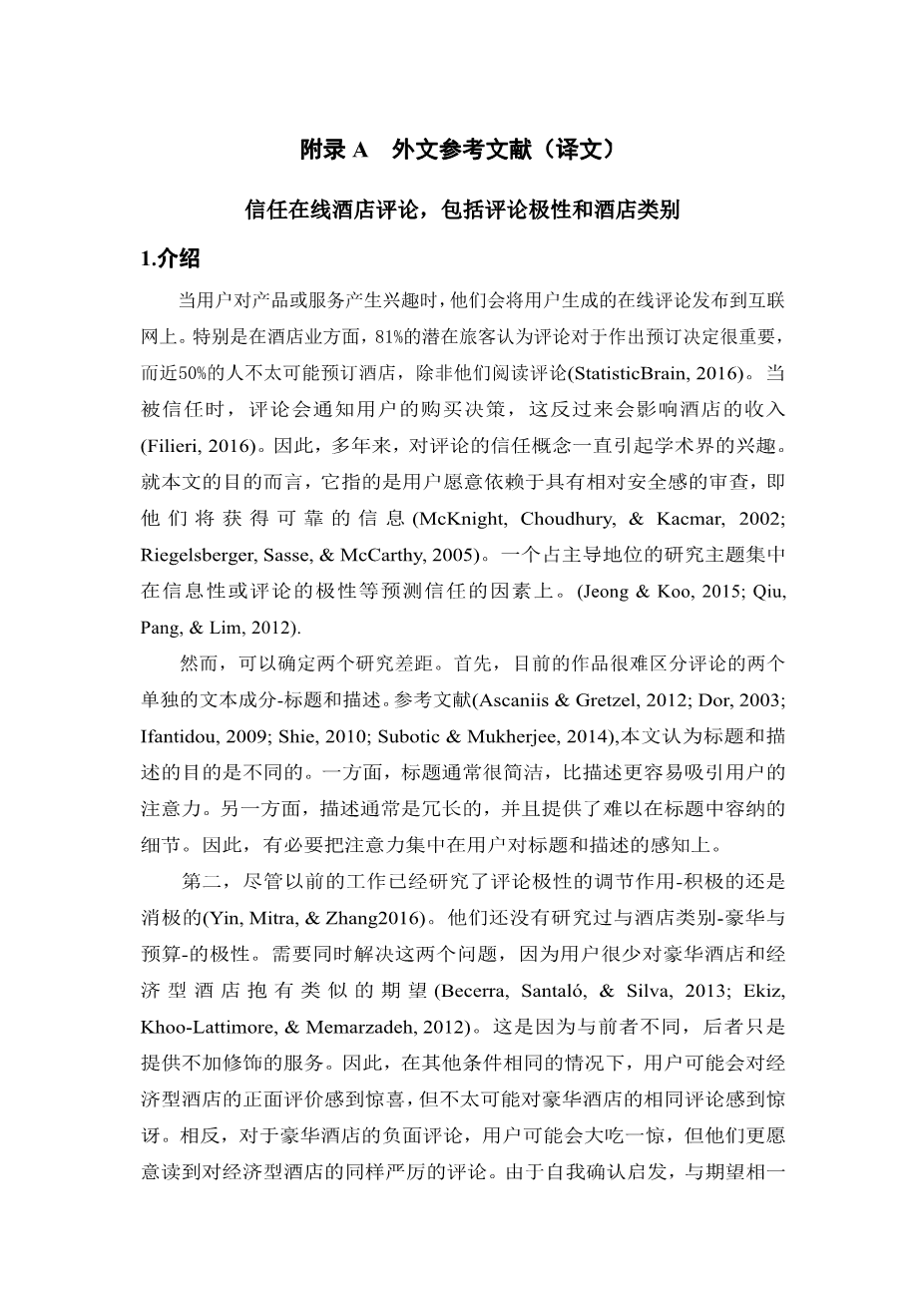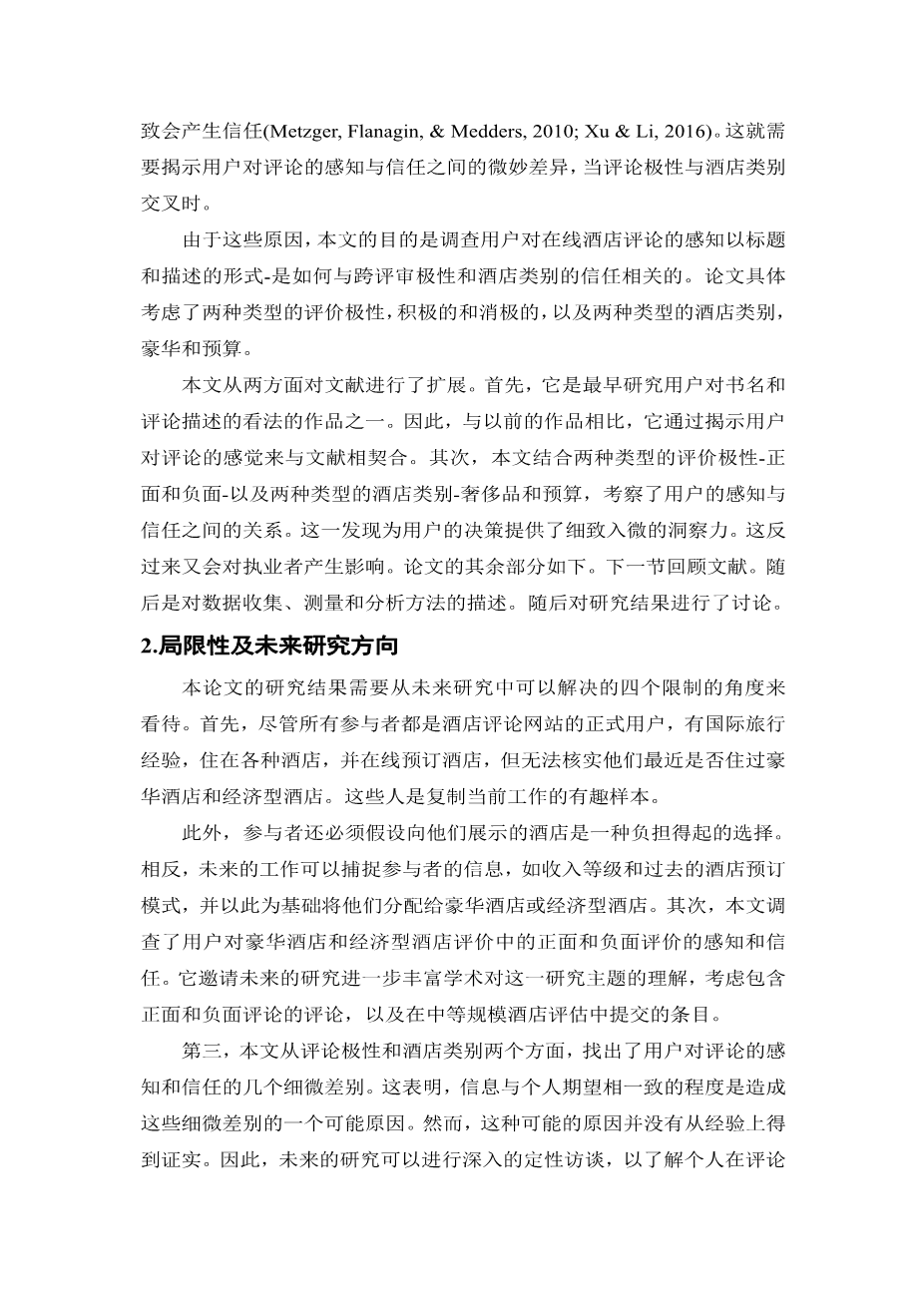Trust in online hotel reviews across review polarity and hotel category
Introduction:
When users develop an interest in a product or a service, they turn user-generated online reviews posted on the Internet. Particularly in the context of the hotel industry, 81% of potential travellers consider reviews important to make booking decisions, and close to 50% are unlikely to book a hotel unless they read reviews (StatisticBrain, 2016). When trusted, reviews inform users purchase decision-making, which in turn can impact hotels revenues (Filieri, 2016). Hence, the concept of trust in reviews has been piquing scholarly interest over the years. For the purpose of this paper, it refers to users willingness to depend on reviews with a sense of relative security that they will receive reliable information (McKnight, Choudhury, amp; Kacmar, 2002; Riegelsberger, Sasse, amp; McCarthy, 2005). A dominant research theme focuses on factors such as informativeness or polarity of reviews that predict trust (Jeong amp; Koo, 2015; Qiu, Pang, amp; Lim, 2012).
Nonetheless, two research gaps can be identified. First, current works hardly differentiate between the two separate textual components of reviews—titles and descriptions. Informed by the literature (Ascaniis amp; Gretzel, 2012; Dor, 2003; Ifantidou, 2009; Shie, 2010; Subotic amp; Mukherjee, 2014), this paper argues that titles and descriptions serve different purposes. On the one hand, titles are generally succinct and capture users attention more easily than descriptions. On the other, descriptions are usually lengthy and provide details that are difficult to accommodate in titles. Therefore, there is a need to focus on users perception of titles and descriptions granularly.
Second, even though previous works have examined the moderating role of review polarity—positive versus negative (Yin, Mitra, amp; Zhang2016), they have yet to study review polarity together with hotel category—luxury versus budget. Tackling these two in tandem is needed because users seldom have similar expectation of luxury and budget hotels (Becerra, Santaloacute;, amp; Silva, 2013; Ekiz, Khoo-Lattimore, amp; Memarzadeh, 2012). This is because unlike the former, the latter simply offers no-frills service. Hence, all else being equal, users can be pleasantly surprised by positive reviews for budget hotels but are less likely to be amazed by the same reviews for luxury hotels. Conversely, users may be taken aback by negative reviews for luxury hotels but are more prepared to read similarly damning reviews for budget hotels. Congruence with expectation engenders trust due to the self-confirmation heuristic (Metzger, Flanagin, amp; Medders, 2010; Xu amp; Li, 2016). This calls for uncovering subtle differences in the relation between users perception of reviews and trust when review polarity is crossed with hotel category.
For these reasons, the goal of this paper is to investigate how users perception of online hotel reviews—structured as titles and descriptions—is related to trust across review polarity and hotel category. The paper specifically considers two types of review polarity, positive and negative, along with two types of hotel category, luxury and budget.
The paper extends the literature in two ways. First, it represents one of the earliest works to examine users perception of both titles and descriptions of reviews. Hence, it dovetails the literature by shedding light on users perception of reviews more granularly compared with previous works. Second, the paper examines how users perception is related to trust by combining the two types of review polarity—positive and negative—with the two types of hotel category—luxury and budget. The findings offer nuanced insights into how expectation affects users decision-making. These in turn offer implications for practioners.
The remainder of the paper proceeds as follows. The next section reviews the literature. This is followed by a description of the methods for data collection, measurements and analyses. The results are pre- sented next followed by a discussion of the findings.
2 Limitations and future research directions
The findings of this paper need to be viewed in light of four limitations that could be addressed in future research. First, even though all the participants were regular users of hotel review websites, had experiences of international travel, stayed in a variety of hotels, and made online hotel booking; it was not possible to verify if they had stayed in both luxury and budget hotels in the recent past. Such people constitute an interesting sample to replicate the current work.Moreover, the participants were required to assume that the hotel shown to them was an affordable option. Instead, future works could capture participants information such as income brackets and past hotel booking patterns, and use these as a basis to assign them to either luxury or budget hotels.
Second, this paper investigated users perception and trust for positive and negative reviews submitted in evaluation of either luxury or budget hotels. It invites future research to further enrich the scholarly understanding in this research theme by considering reviews that contain a mixture of both positive and negative comments, as well as entries submitted in evaluation of mid-scale hotels.
Third, this paper identified several nuances in users perception and trust in reviews across review polarity and hotel category. It suggests that the degree to which information is aligned to individuals expectation is a possible reason for these nuances. However, such a possible reason was not empirically verified. Hence, future research could conduct in-depth qualitative interviews to understand individuals motivations and reasons to process information differently across review polarity and hotel category.
Fourth, to manage the cognitive
剩余内容已隐藏,支付完成后下载完整资料


英语译文共 4 页,剩余内容已隐藏,支付完成后下载完整资料
资料编号:[608767],资料为PDF文档或Word文档,PDF文档可免费转换为Word
课题毕业论文、开题报告、任务书、外文翻译、程序设计、图纸设计等资料可联系客服协助查找。
您可能感兴趣的文章
- 饮用水微生物群:一个全面的时空研究,以监测巴黎供水系统的水质外文翻译资料
- 步进电机控制和摩擦模型对复杂机械系统精确定位的影响外文翻译资料
- 具有温湿度控制的开式阴极PEM燃料电池性能的提升外文翻译资料
- 警报定时系统对驾驶员行为的影响:调查驾驶员信任的差异以及根据警报定时对警报的响应外文翻译资料
- 门禁系统的零知识认证解决方案外文翻译资料
- 车辆废气及室外环境中悬浮微粒中有机磷的含量—-个案研究外文翻译资料
- ZigBee协议对城市风力涡轮机的无线监控: 支持应用软件和传感器模块外文翻译资料
- ZigBee系统在医疗保健中提供位置信息和传感器数据传输的方案外文翻译资料
- 基于PLC的模糊控制器在污水处理系统中的应用外文翻译资料
- 光伏并联最大功率点跟踪系统独立应用程序外文翻译资料



